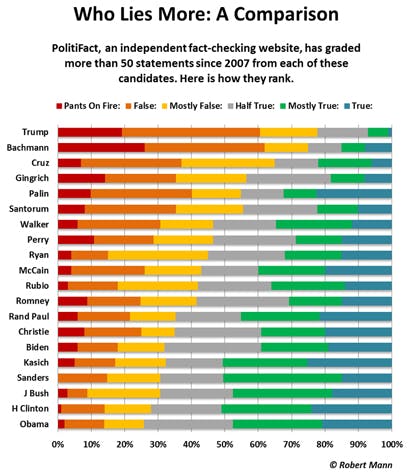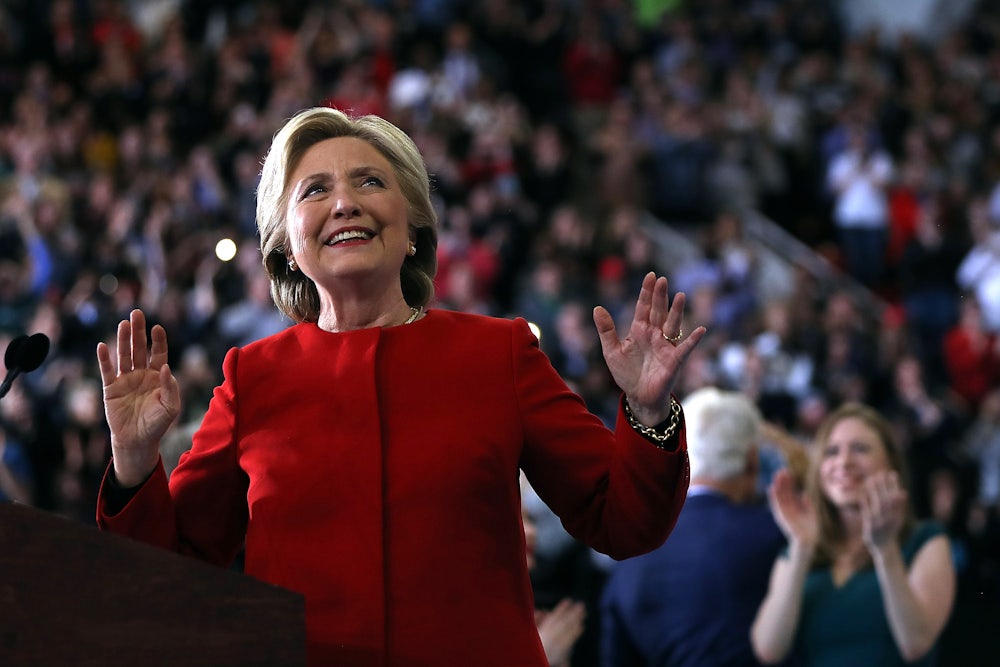Hillary Clinton is on the cusp of history, likely to be elected Tuesday as America’s first female president. That’s a momentous achievement for a woman who’s already peerless in our public life. Yet the bigger story of this Election Day is a nation on the brink, with Donald Trump’s victory improbable but still possible despite his manifest unfitness for office and the danger he poses to our democracy and the world’s stability.
Part of the reason for that possibility can be found in public opinion of the candidates. By four percentage points, likely voters in two national surveys hold a belief that’s demonstrably untrue: that Trump is more honest and trustworthy than Clinton. Voters trust Trump over Clinton 44 percent to 40 percent, according to an ABC News/Washington Post poll taken November 2-5; and by 37 percent to 33 percent, according to a Fox News poll taken November 3-6.
It’s positive news that a strong majority of these Americans knows Trump can’t be trusted. His candidacy has flummoxed fact-checkers, and his capacity for lying is unprecedented in presidential politics. But to believe that Clinton is just as bad or even worse than Trump on this issue is to succumb to false equivalence.
The 2016 campaign has not been, as Meet the Press moderator Chuck Todd said on MSNBC Monday, a “post-truth election.” Clinton has not run a post-truth campaign. She hasn’t always been truthful; The Washington Post’s Fact Checker awarded her seven of its worst Four-Pinocchio ratings throughout the race. But critically, the Post noted that this is an average score, putting her “in about the same range as President Obama and former Massachusetts governor Mitt Romney in 2012.” (There was far less discussion about the end-of-truth-as-we-know-it four years ago.)
Moreover, “Trump has amassed such a collection of Four-Pinocchio ratings—59 in all—that by himself he’s earned as many in this campaign as all other Republicans (or Democrats) combined in the past three years.” Todd acknowledged the differential in his segment, but failed to drive the point home.

It’s not just the Post either. PolitiFact published a comparison of Clinton and Trump on its Truth-O-Meter, and the vast majority of her statements were all or partially truth. The vast majority of his statements were all or partially false.
As The Atlantic’s conservative senior editor, David Frum told The Ezra Klein Show over the weekend, “Hillary Clinton tells lies, but she never forgets that the truth is there.” She might shade the truth or hide it, misrepresent it or even evade it—as all politicians sometimes do. What she rarely does is deny it outright.
Trump, of course, does that constantly. As Vox put it succinctly a month ago, he “has spent his entire campaign gaslighting America by denying that he ever said or did things that we have clear video or text evidence that he did, in fact, say or do.”
Clinton’s honesty needn’t be graded on a Trumpian curve. In August, Kevin Drum at Mother Jones concluded “Hillary Clinton Is One of America’s Most Honest Politicians,” citing the chart above, of PolitiFact scores for 20 of America’s most prominent pols. Drum noted that The New York Times reached a similar conclusion; Jill Abramson, the former executive editor of the Times, called Clinton “fundamentally honest and trustworthy” in her Guardian column in March, citing PolitiFact and her own reporting.
Clinton can even be honest to a fault. Several times during this campaign, she has told a truth at her own political expense.
In March, she told CNN that “we’re going to put a lot of coal miners and coal companies out of business” since “we’ve got to move away from coal and all the other fossil fuels”—a harsh but accurate assessment of the future of such jobs. Her broader quote was about helping the affected workers by bringing them clean energy jobs, but Trump hammered her for it nonetheless. Last month, CNN reported, “Hillary Clinton might lose Ohio because she badmouthed coal.”
And in September, speaking at a New York fundraiser, Clinton said, “To just be grossly generalistic, you could put half of Trump’s supporters into what I call the basket of deplorables. Right? The racist, sexist, homophobic, xenophobic, Islamaphobic—you name it.” This resulted in widespread condemnation—it would soon become a Trump ad—and Clinton later said she regretted saying “half.”
Retreat was wise politically, but The Atlantic’s Ta-Nehisi Coates and Slate’s Jamelle Bouie, two prominent black writers, argued Clinton was right on the substance. Coates wrote that “data is on her side”:
Much like Trump’s alleged opposition to the Iraq War, this not an impossible claim to investigate. We know, for instance, some nearly 60 percent of Trump’s supporters hold “unfavorable views” of Islam, and 76 percent support a ban on Muslims entering the United States. We know that some 40 percent of Trump’s supporters believe blacks are more violent, more criminal, lazier, and ruder than whites. Two-thirds of Trump’s supporters believe the first black president in this country’s history is not American. These claim are not ancillary to Donald Trump’s candidacy, they are a driving force behind it.
How come voters see Trump, for whom serial dishonesty isn’t even his most damning character flaw, as more honest and trustworthy than Clinton? There’s an element of sexism, to be sure. And there’s a kernel of truth to the “vast right-wing conspiracy”—a sustained, coordinated campaign that has for decades sought to destroy the Clintons as a political force.
The key, however, is Trump’s one true talent for branding. That’s how he dispatched the likes of “Little Marco” and “Lyin’ Ted” in the primary, before relentlessly hammering “Crooked Hillary” as a liar on the stump (“She lies more than any human being,” he said two weeks ago) and in advertising. It’s further proof of the well-documented fact that simply repeating falsehoods can make people belief they’re true.
Whatever the reasons, millions of Americans who are voting today somehow believe that Hillary Clinton is a liar who can’t be trusted. Here’s hoping she’ll get four years to prove them otherwise.
